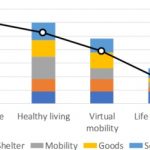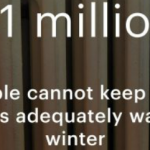Building construction and operation accounts for 37% of global energy-related carbon emissions, according to the UNEP. And every part of the world needs new housing. The U.S. has a 3.8-million-unit housing shortage. Jeffrey Wolf, writing for NREL, describes how modular factory-made affordable net-zero housing is being developed that costs no more than existing construction methods. To get the greatest decarbonisation impact most cost-effectively, … [Read more...]
Energy-efficient and affordable housing will increase public support for the Green Deal
Energy poverty – the inability to afford basic household energy needs – affects up to one-third of U.S and European households. The energy transition can be part of the solution, says Clare Taylor. Targeted energy-efficient retrofits and newbuilds for low-income households will cut bills and improve living conditions. This will not only cut emissions, but get the beneficiaries behind wider climate change policies like the Green Deals in Europe … [Read more...]
Eradicate global poverty, meet climate goals, by avoiding rich-world energy consumption patterns
There is concern that eradicating poverty in the global south means their growing wealth and energy consumption will make our climate targets too hard to meet. Here, Jarmo Kikstra and Narasimha Rao, writing for Carbon Brief, explain that the energy needed to eradicate poverty is compatible with climate goals, provided that policymakers focus on delivering decent living standards, and not copying the affluence and habits of rich countries. Most … [Read more...]
New rules for EU green bonds to raise €350bn/yr, but no decision on nuclear and gas
The EU needs €350bn/year from private investors to fill the Green Deal’s funding gap. The rules for the new green bonds that companies can issue to raise money are supposed to set a “gold standard”, ensure there’s no greenwashing, and make Europe the best place to invest your money sustainably. Benjamin Wehrmann at CLEW summarises the new strategy that was presented on 6th July, and has gathered reactions. Particular attention is paid to … [Read more...]
Behaviour Change: Covid-19 lockdown kicks open the door to a net-zero pathway
Working from home and minimal travel are “no brainer” ways to drastically reduce emissions. They’ve never been tried on a nationwide scale anywhere. Now they are, everywhere. Everyone is doing their best to make it work. Next, food waste should also be in decline, hopefully. Even if panic stockpiling happens, people’s mindsets are being changed as they try to use everything they’ve bought. The act of re-thinking what and how much we eat, in every … [Read more...]
Behaviour Change: measuring complex mobility options to make cities smarter
How do you factor future behaviour change into transport, housing, workplace and energy infrastructure planning? Clearly, future plans based on past behaviour will end up being wrong. And metrics that tell us which behaviour is most efficient can point us in better directions. We won’t find the answer until we start measuring it. That’s why the National Renewable Energy Laboratory (NREL) is leading a collaboration of U.S. government and academia … [Read more...]
Majority of EU countries unable to keep citizens warm this winter
Press releases this week from Friends of the Earth Europe and the European Greens highlight energy poverty levels on our doorstep in Europe. This followed the publication of new research on OpenEXP. It reminds you of the vital benefits of maximising energy efficiency - getting the same for less energy or getting more from the same. Amory Lovins (Rocky Mountain Institute) called upon us to "Imagine being able to save half the electricity for free … [Read more...]








